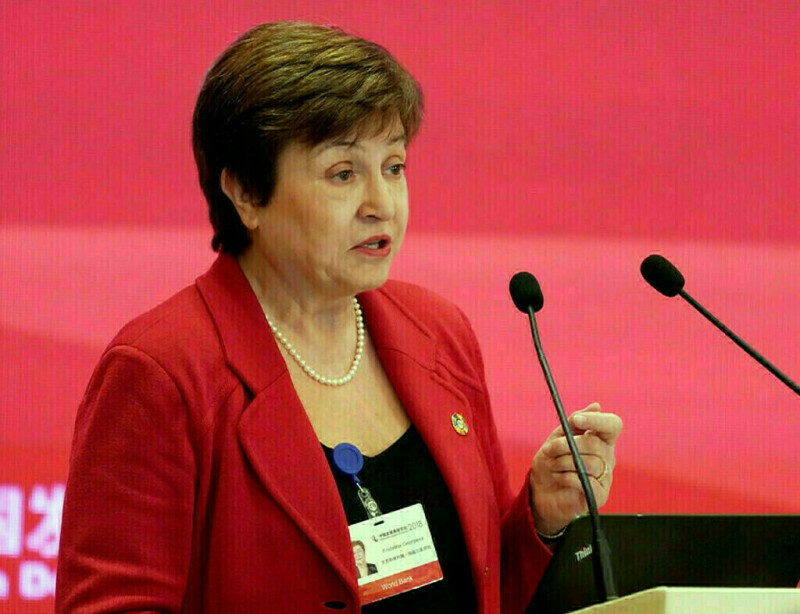WASHINGTON: Global finance leaders came to Washington this past week seeking clarity on what it would take to get some relief from President Donald Trump’s multi-layered tariff assault and on just how much pain it will bring to the world economy.
Most headed home with more questions than answers.
Many participants in the International Monetary Fund and World Bank Spring Meetings had a sense that Trump’s administration was still conflicted in its demands from trading partners hit with his sweeping tariffs.
During the whirlwind week, many finance and trade ministers sought to meet with US Treasury Secretary Scott Bessent and other key Trump administration officials, to no avail.
Those that did were often told to be patient – even as the clock steadily ticks down on the 90-day pause Trump had granted on the steepest levies.
Indeed, not a single deal was finalized over the course of the week despite the Trump administration touting the receipt of 18 written proposals and a full slate of negotiations.
“We are not negotiating. We are just presenting, discussing the economy,” said Polish Finance Minister Andrzej Domanski. He added that he stressed “how this uncertainty is bad for Europe, for the US I mean, it’s actually bad for everyone.”
Warnings that the tariffs – 25% on all US imports of vehicles, steel and aluminum and currently 10% for most everything else – would cause painful damage to the US and other major economies went largely unheeded by US officials.
Policymakers are achieving the art of the impossible, IMF chief says
“We know that they think – that it won’t be that bad,” Domanski said. “They think it’s a short-term pain, long-term gain. And I’m afraid that we’ll have short-term pain, long-term pain.”
The Trump administration’s most substantial trade negotiations during the week were with Japan and South Korea, but the results were inconclusive as Bessent cited “productive” talks with both countries.
Specific currency targets for the Japanese yen were not discussed, but both countries’ currency policies are expected to be part of future talks as the US sees currency weakness against the dollar as a nontariff barrier to American exports.
The IMF took a slightly more optimistic view of the economic fallout from the highest US tariffs in more than a century, slashing growth forecasts for most countries in its World Economic Outlook but stopping far short of predicting recessions – even for the US and export-dependent China, which now faces US tariffs of 145% on many goods.
IMF Managing Director Kristalina Georgieva acknowledged that member countries were anxious about the uncertainty shock to a global economy buffeted by pandemic, inflation and wars but held out hope that trade negotiations would ease the tariff strains.
“We recognize that there is work under way to resolve trade disputes and reduce uncertainty,” Georgieva told reporters.
“Uncertainty is really bad for business, so the sooner there is this cloud that is hanging over our heads is lifted, the better for profit, for growth, for the world economy.”
Several finance officials told Reuters that odds of recession were higher than the IMF’s 37% chance, citing private sector forecasts.
Debt risks rise
Eric LeCompte, executive director of Jubilee USA Network, a faith-based nonprofit group advocating debt relief, said that the IMF’s forecasts were clearly aimed at preventing market panic, even as officials in private meetings expressed concerns about new debt crises emerging.
“It was a do-nothing kind of week,” LeCompte said, adding that debt discussions were inconclusive and overshadowed by tariff talks.
Reza Baqir, a former Pakistan central bank governor who now heads sovereign debt advisory at Alvarez & Marsal, said: “For many developing countries, especially in the Global South, there is a real sense of despair that the agenda on Financing for Development is really not center-stage.
Tariff deal talks to dominate IMF-World Bank meetings this week
And who is going to be there to champion that debate?“ World Bank chief economist Indermit Gill also sounded an alarm on rising debt levels for emerging markets, noting that tariffs had prompted a sharp slowdown in trade and foreign direct investment that are crucial to developing country growth.
He and other World Bank and IMF officials told countries to cut their own tariffs to boost growth prospects.
No us withdrawal
Policymakers did breathe a sigh of relief when Bessent expressed US support for the IMF and the World Bank, declaring that they have “enduring value” but criticizing their “mission creep” into climate, gender and equality issues.
Rather than withdrawing from the institutions as prescribed by the Project 2025 Republican policy manifesto, Bessent said he wanted to refocus them on their core missions of economic stability and development, with expanded World Bank energy financing options and an end to China loans.
Participants at the meetings, along with financial markets, were encouraged by Bessent’s comments early in the week that triple-digit US tariffs on Chinese goods and vice versa were unsustainable, suggesting that a deal to ease them could be reached soon.
But China denied Trump’s assertions that tariff negotiations were under way with Beijing, adding to the week’s confusion over his tariffs and offering little reassurance to country delegations.
“I think most people left here bracing for things to get worse from an economic perspective,” said Josh Lipsky, a former IMF adviser who is now senior director of the Atlantic Council’s GeoEconomics Center.
“The broad picture, when you step back, is very concerning.”
But a big challenge for developed countries at the moment was the recent selloff in US Treasury debt and other dollar-based assets, which indicated an erosion of trust in US economic policies, Lipsky said.
IMF agreement brings relief, but economic challenges persist, say experts
Trust in US economic leadership was the fundamental reason that the dollar had achieved reserve currency status, he said. While the US economy is too big to ignore the dollar for now, trading partners will try to seek alternatives unless that trust is repaired, he added.


